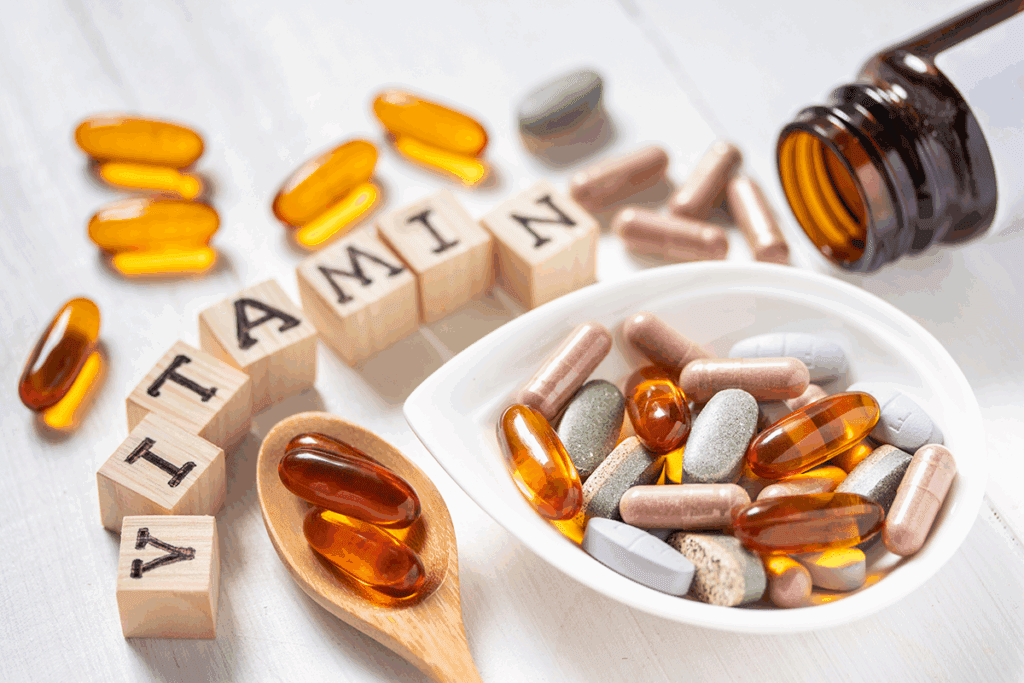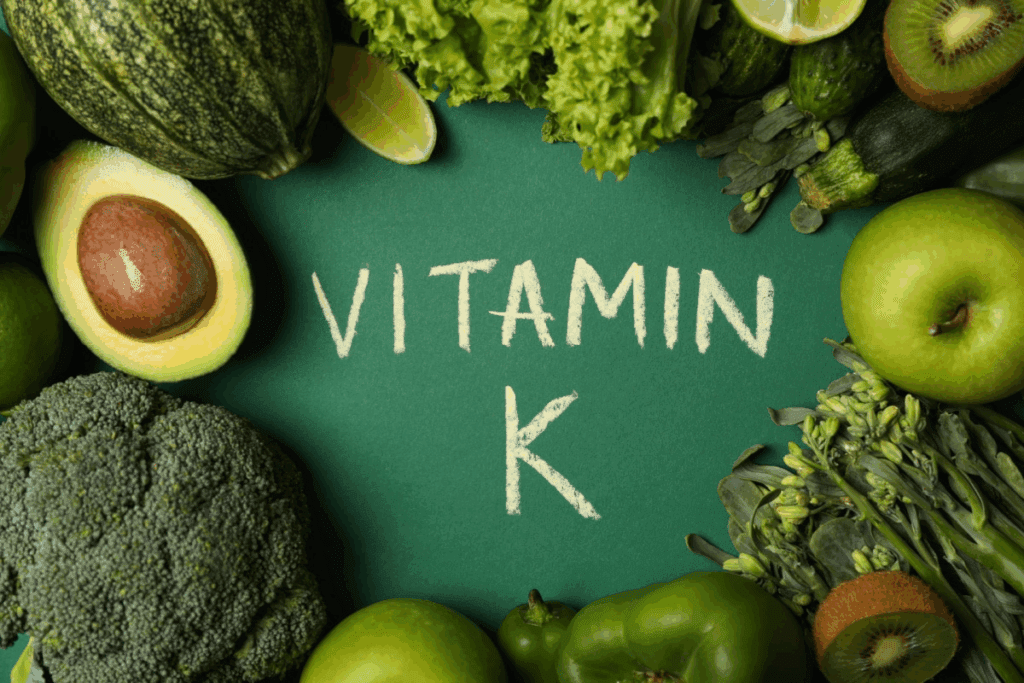Last Updated on November 4, 2025 by mcelik

Tendon injuries affect millions of people, causing pain and limiting movement. Understanding the role of the right vitamin for tendon healing is key to effective recovery and treatment.
Collagen production vitamins are vital for healing since collagen is a main part of tendons. Getting enough essential vitamin for tendon healing can greatly support recovery and strengthen tissues.
Tendon health is closely tied to nutrition. It’s important to focus on each vitamin for tendon healing that helps repair, protect, and maintain tendon flexibility. This article explores the most effective vitamins for tendon healing and how they contribute to long-term tendon health.
It’s important to understand tendon injuries to heal properly. These injuries can be sudden or long-term, impacting people differently.
There are several types of tendon injuries. Tendonitis is when tendons get inflamed from too much use. Tendinosis is when the tendon tissue breaks down but doesn’t get inflamed much.
The healing of tendons goes through three stages: inflammation, repair, and remodeling. The first stage, inflammation, brings more blood and cells to the area. The repair stage makes new collagen fibers. The last stage, remodeling, makes the new tissue stronger.
Key stages in tendon healing:
Vitamins like C and D are key for tendon healing. Vitamin C helps make collagen, and vitamin D controls inflammation.

Vitamins are key in helping tendons heal. Tendons connect muscles to bones and often get injured. Vitamins help keep tendons healthy and aid in recovery after an injury.
Vitamins are essential for fixing and growing tissues. Vitamin A is important for tendon growth and healing. It helps make collagen, a key part of tendons. Vitamin E also helps by reducing damage and supporting healing.
The healing of tendons involves many steps. Vitamins help by making growth factors needed for repair.
Tendon regeneration is complex and vitamins play a big part. Collagen production vitamins, like Vitamin C, are important for making collagen. The healing process needs many vitamins and nutrients.
Knowing how vitamins help tendons heal is important. It helps create better treatment plans that include nutrition and physical therapy.
Vitamin C is key for making collagen, which is vital for tendons. Collagen is the most common protein in our bodies. It gives tendons strength and flexibility.
Vitamin C helps stabilize collagen molecules. Without enough vitamin C, tendons become weaker. Vitamin C’s role in collagen formation is about both quantity and quality.
Vitamin C controls prolyl and lysyl hydroxylases, enzymes needed for strong tendons. This is essential for tendon health.
Many studies show vitamin C’s role in tendon repair. It boosts collagen making and improves tendon strength.
A study in a Journal found vitamin C helps animal tendons heal. These findings highlight vitamin C’s benefits for tendon recovery.
The right vitamin C dose for tendon recovery varies. Adults should take 500 to 1000 mg daily for tendon health.
| Condition | Recommended Vitamin C Dosage |
| Mild Tendon Injury | 500 mg/day |
| Moderate Tendon Injury | 750 mg/day |
| Severe Tendon Injury | 1000 mg/day |
Always talk to a healthcare professional before starting supplements. They can guide you based on your needs.
Vitamin D is key in controlling inflammation, which is vital for tendon healing. Tendon injuries cause inflammation, a natural response to damage. But, long-term inflammation can slow down healing. Vitamin D has anti-inflammatory effects, helping to manage the immune response and aid tendon repair.
Vitamin D3, the active form of vitamin D, aids in tendon healing. It controls the genes involved in healing and reduces inflammation by stopping pro-inflammatory cytokines. Research shows vitamin D3 boosts tendon cell growth and differentiation, helping repair damaged tendons.
“Vitamin D deficiency is linked to musculoskeletal disorders, including tendon injuries,” studies say. It’s important to have enough vitamin D3 for healthy tendons and recovery.
Vitamin D deficiency raises the risk of tendon injuries and disorders. People with low vitamin D are more likely to have tendon pain and degeneration. Vitamin D’s anti-inflammatory effects are key in stopping tendon damage. Keeping vitamin D levels in check is vital for tendon health.
Keeping vitamin D levels right is essential for tendons. While the ideal range varies, 30 to 50 ng/mL is usually good for musculoskeletal health. It’s wise to check vitamin D levels often, mainly for those at risk of deficiency, to keep tendons healthy.
In summary, vitamin D is vital for controlling inflammation and helping tendons heal. Getting enough vitamin D through sun, diet, and supplements is key for healthy tendons and recovery from tendon injuries.
Vitamin K2 is key for stronger connective tissues and tendon health. It’s known for its role in bone and vascular health. But its effect on tendons is just as important. Knowing how vitamin K2 works helps support tendon health through food.

Vitamin K2 boosts tendon strength by activating proteins for bone and tissue health. Osteocalcin is a key protein for bone mineralization. Vitamin K2 makes sure osteocalcin works right, binding calcium well.
This helps bones and tendons stay strong and resilient.
“Vitamin K2’s role in activating osteocalcin is a critical mechanism by which it supports tendon health and strength.” This process keeps connective tissues strong across the body.
Vitamins K2 and D work together for better health. Vitamin D helps with calcium absorption and bone health. Vitamin K2 makes sure calcium goes to bones and teeth, not soft tissues.
“The combination of vitamins K2 and D can be seen as a dynamic duo for bone and tendon health, working together to ensure proper calcium utilization and bone mineralization.”
Vitamins K2 and D are a team for tendon health and musculoskeletal well-being. They support important biochemical processes.
Vitamin A plays a big role in keeping tendons healthy and helping them heal. Tendon injuries need a mix of treatments, and vitamin A is key in fixing them. It helps tendons grow back strong.
Vitamin A is vital for fixing tissues, like tendons. It helps by making more cells and proteins needed for repair. Vitamin A also controls genes that help in healing.
Key mechanisms of vitamin A in tendon regeneration include:
It’s important to get the right amount of vitamin A for healing. Too little or too much can harm your health. Finding the right amount is key to using vitamin A for tendon repair.
Recommended daily intake of vitamin A varies, but generally, adults should consume between 700 to 900 micrograms per day. Foods like liver, fish, and dairy give you vitamin A. You can also take supplements.
To ensure optimal healing, consider the following:
Tendon injuries can be managed with vitamin E’s strong antioxidant powers. Vitamin E is a fat-soluble vitamin that protects cells from free radicals. It’s great for tendon health because of its antioxidant benefits.
Vitamin E reduces oxidative stress, helping tendons heal naturally. It keeps cell membranes safe from damage. This keeps tendon tissues strong.
Oxidative stress happens when free radicals outdo the body’s defenses. Vitamin E fights free radicals, lowering stress and helping tendons heal. Research has shown that vitamin E boosts the body’s antioxidant system, aiding in tendon repair.
| Mechanism | Benefit |
| Neutralizing free radicals | Reduces oxidative stress |
| Protecting cell membranes | Maintains tendon tissue integrity |
Vitamin E helps in many ways for tissue repair. It not only lowers oxidative stress but also helps in making healthy tissue. It boosts collagen, which is key for strong tendons.
In short, vitamin E is key for tendon health. It fights oxidative stress and aids in tissue repair. It’s a must-have for any tendon recovery plan.
B vitamins are key for tendon health and recovery. They help with energy, nerve function, and heart health. These are all important for overall well-being and tendon health.
Vitamin B6, or pyridoxine, is important for many body functions, including tendon recovery. It helps with protein metabolism, which is vital for tendon repair. Adequate Vitamin B6 intake supports healing by providing the body with what it needs to fix tendons.
Vitamin B12 is key for making red blood cells. These cells carry oxygen to damaged tendons, helping them heal. A lack of Vitamin B12 can slow down tendon healing, so it’s important to keep levels up.
Other B vitamins like Thiamin (B1), Riboflavin (B2), and Niacin (B3) help with energy and metabolism. They indirectly support tendon function. A balanced intake of these vitamins is essential for healthy tendons.
In summary, B vitamins are vital for tendon health and recovery. Getting enough of these vitamins through diet or supplements can greatly improve tendon health.
Many nutrients help repair and strengthen tendons, not just vitamins. These nutrients work together to aid in the healing process.
Magnesium is key for tendon health. It helps muscles relax and contract properly, reducing injury risk. Magnesium deficiency can cause muscle cramps and inflammation, slowing down tendon healing.
Studies show magnesium helps tendons function better and reduces pain in tendonitis patients. It’s important to get enough magnesium through food or supplements for tendon repair.
Omega-3 fatty acids, like EPA and DHA, fight inflammation. They are vital for tendon healing. Omega-3s help reduce inflammation, supporting tendon repair.
Research finds omega-3s lower inflammation and improve symptoms in tendon injuries. Eating foods rich in omega-3s or taking supplements can help tendon health.
Zinc and copper are important for collagen, a key tendon component. Zinc helps form collagen, while copper keeps connective tissue strong.
| Nutrient | Role in Tendon Repair | Food Sources |
| Magnesium | Regulates muscle contraction, reduces inflammation | Dark leafy greens, nuts, seeds |
| Omega-3 Fatty Acids | Controls inflammation | Fatty fish, flaxseeds, walnuts |
| Zinc | Supports collagen synthesis | Oysters, beef, chicken, pumpkin seeds |
| Copper | Maintains connective tissue integrity | Shellfish, nuts, legumes |
Eating foods rich in magnesium, omega-3s, zinc, and copper supports tendon health. Along with vitamins, these nutrients help tendons heal faster.
Eating a balanced diet full of vitamins and nutrients is key for tendon health. Tendons, which connect muscles to bones, need these nutrients to stay strong and heal when hurt.
Eating foods high in vitamins and minerals helps tendons a lot. Vitamin C in citrus fruits, berries, and greens is great for making collagen. Vitamin D from fatty fish, dairy, and sunlight helps control inflammation. Vitamin K2 in fermented foods and some cheeses is important for bone and tendon health.
Creating a meal plan for tendon healing needs careful thought. It’s important to eat a variety of foods rich in vitamins and minerals. A diet with fruits, veggies, lean proteins, and healthy fats is best for tendon repair.
By eating a balanced diet with these nutrient-rich foods, you can help your tendons heal better and stay healthy.
The right supplements can help a lot when you have injured tendons. Tendon injuries are hard to heal, and food is important. But, supplements can give extra help.
Vitamin supplements are good if you’re missing something in your diet. For example, vitamin D supplements are often suggested for tendon injuries. This is true if you don’t get enough sun or eat foods with vitamin D.
Always talk to a doctor before starting supplements. They can tell you if you need them and how much to take.
Vitamin supplements can be helpful but can also cause problems. For instance, too much vitamin E can make bleeding worse, which is bad if you’re on blood thinners.
It’s key to know about possible interactions and side effects. Watch for any bad reactions and change your supplements if needed.
By thinking carefully about vitamin supplements and their risks, you can make smart choices. This helps support your tendon injury recovery.
Tendon rehabilitation is a complex process where vitamins play a key role, backed by clinical evidence. The healing of tendons involves many biochemical pathways. Vitamins are essential in supporting these processes.
Recent studies have shown that certain vitamins are vital for tendon health and rehabilitation. For example, Vitamin C is important for collagen synthesis, a key part of tendon structure. Research has found that Vitamin D deficiency is linked to more tendon injuries and slower recovery times.
A study in a Journal found that Vitamin D supplements helped tendon healing in patients with Vitamin D deficiency. Another study showed Vitamin E’s role in reducing oxidative stress, helping tendon repair.
| Vitamin | Role in Tendon Rehabilitation | Research Findings |
| Vitamin C | Collagen synthesis | Improves tendon strength |
| Vitamin D | Inflammation regulation | Reduces recovery time |
| Vitamin E | Antioxidant protection | Reduces oxidative stress |
Medical professionals stress the need for a balanced diet rich in vitamins for tendon health. They suggest checking vitamin levels, mainly for those prone to tendon injuries or with a history of such injuries.
“Ensuring adequate vitamin intake is key for tendon health and rehabilitation. Vitamins like C, D, and E are vital in different stages of tendon healing.” -An Orthopedic Specialist
Supplements might be needed for those with deficiencies or higher needs. But, it’s important to talk to healthcare providers to find the right supplement plan.
Recovering from tendon injuries needs a mix of vitamins and physical therapy. This approach helps the healing process, cuts down recovery time, and boosts results.
It’s key to match nutrition with exercise for best results. Eating the right foods before and after working out aids tendon repair and eases muscle soreness. For example, vitamin C before exercise can lower oxidative stress. Protein with vitamin B6 after helps muscles recover.
Making a recovery plan means mixing vitamins with physical therapy in a way that fits you. It should match your injury, nutritional needs, and goals. A healthcare professional or a registered dietitian can craft this plan, covering both nutrition and physical therapy.
By mixing vitamins with physical therapy and planning meals right, you can make a strong recovery plan. This plan supports the best tendon healing and overall health.
Tendon health is key for feeling good overall. Vitamins help a lot in healing tendons. Eating well with the right vitamins and nutrients is important for healthy tendons.
Vitamins like Vitamin C, D, K2, A, and E help tendons. They help with collagen, control inflammation, and fight oxidative stress. Adding these vitamins to your diet can really help your tendons heal.
Eating right, taking supplements, and doing physical therapy can help you recover from tendon injuries. Knowing how vitamins and nutrients help tendons can help you keep them strong.
By focusing on vitamin for tendon healing and overall tendon health, you can avoid injuries and live better. Supplements for tendon repair can also be a big help in your recovery plan.
Vitamins C, D, A, E, and K2, along with B vitamins, are key for tendon healing. Vitamin C helps make collagen, which is vital for repair. Vitamin D controls inflammation, and vitamin A aids in tissue growth. Vitamin E acts as an antioxidant, and vitamin K2 strengthens tendons. B vitamins help in recovery and healing.
Vitamin C is essential for making collagen, which is needed for tendon repair. It helps create new collagen fibers, aiding the healing process. Taking enough vitamin C daily is important for tendon recovery.
Vitamin D helps in tendon healing by controlling inflammation and keeping tendon tissue healthy. Not having enough vitamin D can lead to tendon issues. So, it’s important to keep vitamin D levels right for tendon health.
Vitamin supplements can help with tendon recovery if used right. But, it’s important to think about possible side effects and interactions. Always talk to a healthcare professional before starting any supplements.
Omega-3 fatty acids help control inflammation, which is good for tendons. They reduce oxidative stress and help create a better environment for tendon repair.
Foods high in vitamins C, D, A, E, and K2, and B vitamins, are good for tendons. Eat a variety of fruits, veggies, whole grains, lean proteins, and healthy fats. This supports tendon healing.
To make a meal plan for tendon healing, focus on foods rich in vitamins and nutrients. Include fruits, veggies, lean proteins, whole grains, and healthy fats. Getting help from a nutritionist or healthcare professional can be helpful.
Yes, combining vitamins with physical therapy can improve tendon recovery. Eating right at the right time can help the healing process. A good recovery plan includes nutrition and physical therapy.
Doctors often suggest a balanced diet full of essential vitamins and nutrients for tendon health. Sometimes, supplements are recommended to fill nutritional gaps. Always follow professional advice for safe and effective use of vitamins.
Yes, taking vitamin supplements can have risks, like interactions with medicines and side effects. Always talk to a healthcare professional before starting any supplements to avoid risks and ensure safety.
Subscribe to our e-newsletter to stay informed about the latest innovations in the world of health and exclusive offers!